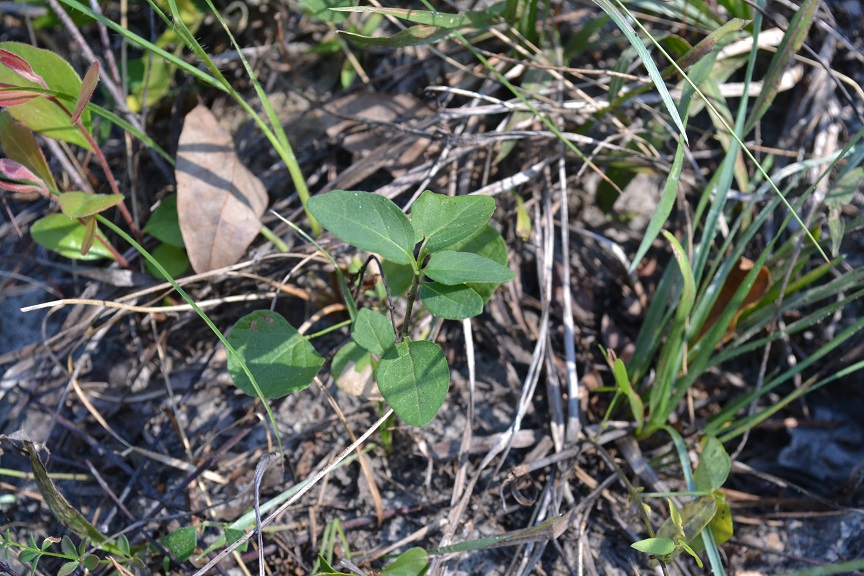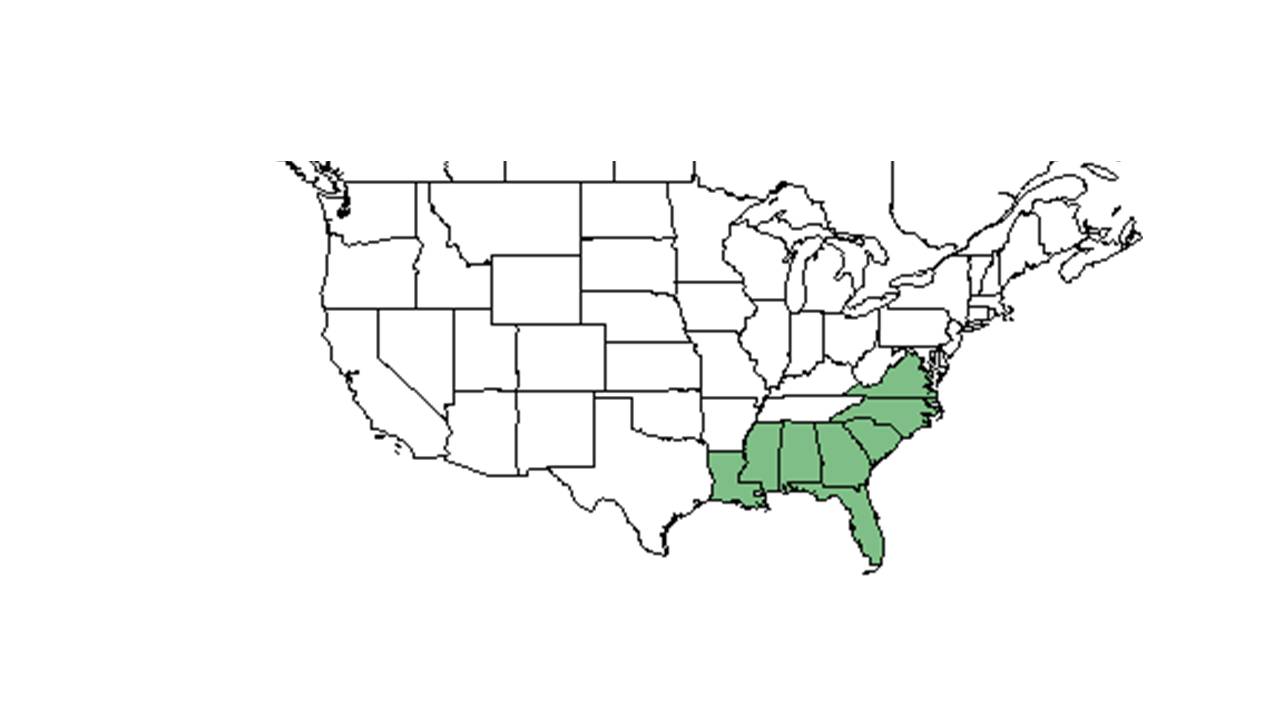Difference between revisions of "Physalis walteri"
(→Conservation and Management) |
Krobertson (talk | contribs) |
||
| Line 26: | Line 26: | ||
==Ecology== | ==Ecology== | ||
===Habitat=== <!--Natural communities, human disturbed habitats, topography, hydrology, soils, light, fire regime requirements for removal of competition, etc.--> | ===Habitat=== <!--Natural communities, human disturbed habitats, topography, hydrology, soils, light, fire regime requirements for removal of competition, etc.--> | ||
| − | ''P. walteri'' has been observed to be growing naturally on beach dunes and back dunes, in longleaf pine flatwoods, turkey oak sandridges, sandy banks bordering salt marhes,longleaf pine/wiregrass uplands, and slash pine flatwoods | + | ''P. walteri'' has been observed to be growing naturally on beach dunes and back dunes, in longleaf pine flatwoods, turkey oak sandridges, sandy banks bordering salt marhes,longleaf pine/wiregrass uplands, and slash pine flatwoods. <ref name="FSU Herbarium">Florida State University Robert K. Godfrey Herbarium database. URL: [http://herbarium.bio.fsu.edu http://herbarium.bio.fsu.edu]. Last accessed: July 2015. Collectors: M Y Menzel, R W Menzel, Loran C. Anderson, James R. Burkhalter, Robert K. Godfrey, O. Lakela, William Lindsey, J. B. Nelson, R. H. Wnek, C. Jackson, Robert L. Lazor, Andre F. Clewell, Robert Kral, George R. Cooley, R. J. Eaton, Sidney McDaniel, Cecil R Slaughter, Marc Minno, James D. Ray, Jr., C. E. Wood, C. E. Smith, R. D. Houk, Ann F. Johnson, M. Davis, Richard R. Clinebell II, D. E. Etles, M. S. Etles, William Lindsey, A. H. Curtiss, D. B. Ward, D. Burch. States and Counties: Florida: Brevard, Broward, Calhoun, Citrus, Collier, Dade, Duval, Escambia, Flagler, Franklin, Hernando, Holmes, Jefferson, Leon, Levy, Martin, Monroe, Nassau, Palm Beach, Pinellas, Orange, Santa Rosa, St. Johns, St. Lucie, Seminole, Suwannee, Taylor, Volusia, Wakulla. Georgia: Thomas. Compiled by Tall Timbers Research Station and Land Conservancy.</ref> It has been seen in human disturbed areas such as pine plantations, old fields, plowed lots, vacant lots, roadsides near beaches, roadside ditches, pastures and levees, lawns, and clearing of a swamp forest. <ref name="FSU Herbarium"/> The soil type associated with ''P/ walteri'' includes dry loamy sand, loamy sand, and calcerous soils (such as limerock). <ref name="FSU Herbarium"/> Associated species include ''Tragia smallii, Pinus palustris, Physalis arenicola, Lobelia puberula, Quercus laevis, Sporobolus, Serenoa repens, Yucca, Lyonia, Lantana, Camara, Carex hyalinolepis, Melica mutica, Aristida, Pinus elliottii'', and ''Helianthus debilis.'' <ref name="FSU Herbarium"/> |
| − | |||
===Phenology=== <!--Timing off flowering, fruiting, seed dispersal, and environmental triggers. Cite PanFlora website if appropriate: http://www.gilnelson.com/PanFlora/ --> | ===Phenology=== <!--Timing off flowering, fruiting, seed dispersal, and environmental triggers. Cite PanFlora website if appropriate: http://www.gilnelson.com/PanFlora/ --> | ||
| − | ''P. walteri'' is seen flowering from April to August | + | ''P. walteri'' is seen flowering from April to August. <ref name="FSU Herbarium"/> |
===Seed dispersal=== | ===Seed dispersal=== | ||
According to Kay Kirkman, a plant ecologist, this species disperses by being consumed by vertebrates (being assumed). <ref name="KK"> Kay Kirkman, unpublished data, 2015. </ref> | According to Kay Kirkman, a plant ecologist, this species disperses by being consumed by vertebrates (being assumed). <ref name="KK"> Kay Kirkman, unpublished data, 2015. </ref> | ||
| Line 46: | Line 45: | ||
==References and notes== | ==References and notes== | ||
| − | |||
Revision as of 14:13, 5 August 2016
| Physalis walteri | |
|---|---|

| |
| Photo taken by Kevin Robertson | |
| Scientific classification | |
| Kingdom: | Plantae |
| Division: | Magnoliophyta - Flowering plants |
| Class: | Magnoliopsida – Dicotyledons |
| Order: | Solanales |
| Family: | Solanaceae |
| Genus: | Physalis |
| Species: | P. walteri |
| Binomial name | |
| Physalis walteri Nutt. | |

| |
| Natural range of Physalis walteri from USDA NRCS Plants Database. | |
Common name: Walter's groundcherry
Contents
Taxonomic notes
Synonyms: Physalis maritima M.A. Curtis; P. viscosa Linnaeus ssp. maritima (M.A. Curtis) Waterfall; P. walteri var. walteri; P. walteri var. glabra (Waterfall) D.B. Ward
Description
Distribution
Ecology
Habitat
P. walteri has been observed to be growing naturally on beach dunes and back dunes, in longleaf pine flatwoods, turkey oak sandridges, sandy banks bordering salt marhes,longleaf pine/wiregrass uplands, and slash pine flatwoods. [1] It has been seen in human disturbed areas such as pine plantations, old fields, plowed lots, vacant lots, roadsides near beaches, roadside ditches, pastures and levees, lawns, and clearing of a swamp forest. [1] The soil type associated with P/ walteri includes dry loamy sand, loamy sand, and calcerous soils (such as limerock). [1] Associated species include Tragia smallii, Pinus palustris, Physalis arenicola, Lobelia puberula, Quercus laevis, Sporobolus, Serenoa repens, Yucca, Lyonia, Lantana, Camara, Carex hyalinolepis, Melica mutica, Aristida, Pinus elliottii, and Helianthus debilis. [1]
Phenology
P. walteri is seen flowering from April to August. [1]
Seed dispersal
According to Kay Kirkman, a plant ecologist, this species disperses by being consumed by vertebrates (being assumed). [2]
Conservation and management
Cultivation and restoration
Photo Gallery
References and notes
- ↑ 1.0 1.1 1.2 1.3 1.4 Florida State University Robert K. Godfrey Herbarium database. URL: http://herbarium.bio.fsu.edu. Last accessed: July 2015. Collectors: M Y Menzel, R W Menzel, Loran C. Anderson, James R. Burkhalter, Robert K. Godfrey, O. Lakela, William Lindsey, J. B. Nelson, R. H. Wnek, C. Jackson, Robert L. Lazor, Andre F. Clewell, Robert Kral, George R. Cooley, R. J. Eaton, Sidney McDaniel, Cecil R Slaughter, Marc Minno, James D. Ray, Jr., C. E. Wood, C. E. Smith, R. D. Houk, Ann F. Johnson, M. Davis, Richard R. Clinebell II, D. E. Etles, M. S. Etles, William Lindsey, A. H. Curtiss, D. B. Ward, D. Burch. States and Counties: Florida: Brevard, Broward, Calhoun, Citrus, Collier, Dade, Duval, Escambia, Flagler, Franklin, Hernando, Holmes, Jefferson, Leon, Levy, Martin, Monroe, Nassau, Palm Beach, Pinellas, Orange, Santa Rosa, St. Johns, St. Lucie, Seminole, Suwannee, Taylor, Volusia, Wakulla. Georgia: Thomas. Compiled by Tall Timbers Research Station and Land Conservancy.
- ↑ Kay Kirkman, unpublished data, 2015.